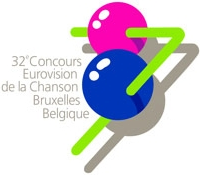| Eurovision Song Contest 1987 | |
|---|---|
 | |
| Dates | |
| Final | 9 May 1987 |
| Host | |
| Venue | Centenary Palace Brussels, Belgium |
| Presenter(s) | Viktor Lazlo |
| Executive producer | Michel Gehu |
| Director | Jacques Bourton |
| Musical director | Jo Carlier |
| EBU scrutineer | Frank Naef |
| Host broadcaster | Radio-télévision belge de la Communauté française (RTBF) |
| Website | eurovision |
| Participants | |
| Number of entries | 22 |
| Debuting countries | None |
| Returning countries | |
| |
| Vote | |
| Voting system | Each country awarded 1-12 point(s) to their 10 favourite songs |
| Winning song | "Hold Me Now" |
The Eurovision Song Contest 1987 was the 32nd edition of the annual Eurovision Song Contest. It took place in Brussels, Belgium, following the country's victory at the 1986 contest with the song "J'aime la vie" by Sandra Kim. Organised by the European Broadcasting Union (EBU) and host broadcaster Radio-télévision belge de la Communauté française (RTBF), the contest was held at the Centenary Palace on 9 May 1987 (also Europe Day) and hosted by French-Belgian singer Viktor Lazlo.
Contents
- Location
- Host city selection process
- Participating countries
- Production and format
- Host broadcaster rule
- Budget
- Rehearsals
- Contest overview
- Spokespersons
- Detailed voting results
- 12 points
- Broadcasts
- See also
- Notes
- References
- External links
Twenty-two countries took part in the contest with Greece and Italy returning to the competition after their absences the previous year. This set the record for the highest number of competing countries up until that point.
The winner was Ireland with the song "Hold Me Now" by Johnny Logan, who had also won the 1980 contest. He became the first performer to have won the Eurovision Song Contest twice. Germany, Italy, Yugoslavia, and the Netherlands rounded out the top five.


